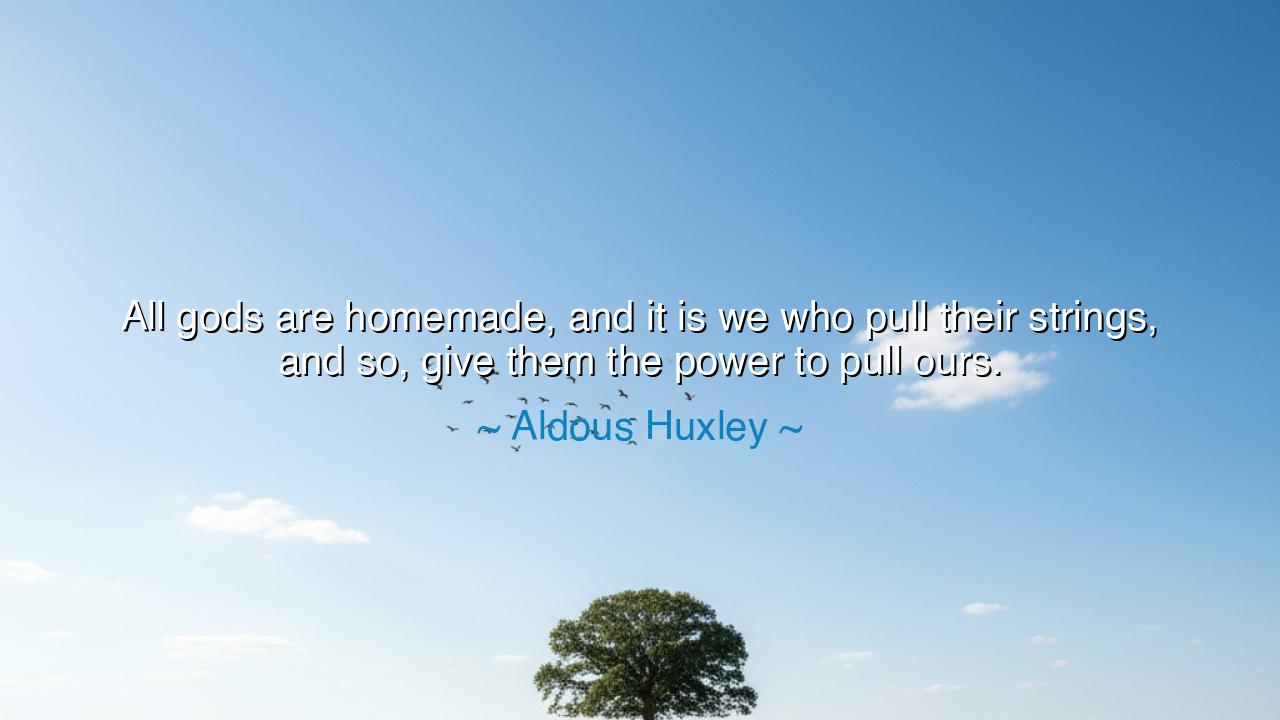
All gods are homemade, and it is we who pull their strings, and
All gods are homemade, and it is we who pull their strings, and so, give them the power to pull ours.






In the words of Aldous Huxley—“All gods are homemade, and it is we who pull their strings, and so, give them the power to pull ours.”—there emerges a meditation both daring and humbling. He speaks not of eternal divinities born beyond time, but of the gods we fashion with our own minds, our fears, our longings. These creations, born of human need, are then exalted above us, so that what we imagined in weakness returns to us in strength, commanding our reverence, shaping our destinies.
The ancients themselves bore witness to this cycle. The Greeks, in their myths, sculpted Zeus, Athena, and Apollo as reflections of their own virtues and flaws. The gods quarreled like mortals, loved like mortals, punished and rewarded like mortals. Yet because men raised these images to the heavens, they lived under their dominion, obeying laws and rituals inspired by their own inventions. Thus Huxley reveals the paradox: we forge the chains that later bind us, granting our own shadows the power to rule.
History gives us many examples. In Rome, emperors declared themselves divine, demanding worship from those who once had lifted them to power. The people, by bowing to their rulers, transformed men into gods, only to be ruled by the very idols they themselves had enthroned. So too in every age: ideologies, wealth, and power are exalted until they become gods in all but name, shaping nations, commanding sacrifice, and dictating what men may dream.
Huxley’s words also point to the profound danger of forgetting the human hand behind the sacred mask. For when we no longer see that these gods are homemade, we surrender our freedom. Like the puppeteer who forgets the strings he holds, we become puppets of our own illusions. Yet to remember this origin is to reclaim power, to recognize that the might of gods, kings, or ideas arises only from the belief we bestow upon them.
Thus, let this lesson endure: be mindful of the gods you create, whether they are of stone, of gold, or of thought. For whatever you raise above yourself will one day rule you. If you craft gods of fear, they will enslave you; if you craft gods of wisdom, justice, and love, they will guide you. The divine that governs humanity is not distant, but woven from the fabric of our own souls—therefore, choose wisely the powers you enthrone.






HQMAM NON HUONG QUE
In Huxley’s view, the gods we create reflect our own desires for power and control. If we give power to something external, do we also relinquish some of our own personal autonomy? Could this be a commentary on how we tend to place trust in external systems, be it religion, government, or ideology, only to find ourselves constrained by them? Are we the ones pulling the strings all along?
CDVu Chi Duc
Huxley’s assertion that 'all gods are homemade' makes me think about how human beings have historically created systems of control and belief. Do we tend to project our desires and fears onto higher powers because it gives us comfort or structure? If we give power to these gods, do we lose our own agency in the process? What does this say about our need for something beyond ourselves to guide us?
THVi Thi Hue
The notion that we give power to gods through our belief and creation is both intriguing and unsettling. Huxley seems to suggest that we have more control over our destiny than we often acknowledge. But does this mean we are equally responsible for the power these creations hold over us? Does this shift our perception of accountability in society? Can we change the nature of these 'gods' by changing how we view them?
BMDat Bui Minh
Huxley’s view on gods being 'homemade' challenges traditional beliefs about divine power. If humans create gods, are we then fully responsible for the influence these gods have on our lives? It makes me wonder about the role of religion and spirituality in shaping society. Can the systems we create, intentionally or unintentionally, shape the way we think, act, and govern ourselves?
APAnh Pham
Aldous Huxley’s quote suggests a profound idea about the relationship between humans and the gods we create. It raises the question: Do we give power to what we worship, or is it the other way around? Could it be that we are subconsciously shaping the ideologies and figures we follow, and in doing so, we empower them to influence us? How much control do we really have over the powers we elevate?